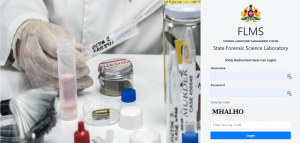Making FSL Karnataka Smarter and Better!
We are happy and proud to implement The Forensic Science Laboratory Management System (FLMS) for Karnataka State FSL, Bangalore.
In today’s criminal justice scenario, forensic investigation has assumed a crucial role. While law enforcement agencies are involved in the collection of evidence, be it physical or digital, it is forensic investigation that deals with the analysis of those evidence in order to establish facts admissible in the court of law. They not only help in the prosecution of offenders but also in exoneration of the innocents. The reports generated by forensic scientists are widely acceptable because when scientific methods are used, there is not much scope for bias. Many cases which were difficult to solve are now easily solved thanks to the development in forensic technology.
So, Forensic Analysis and Evidence Management has become a critical facet of the criminal justice system. At every stage, handlers of evidence must ensure that it has not been compromised, contaminated, or degraded and that its chain of custody is tracked. The criminal justice system’s growing reliance on forensic evidence in casework adds complexity to the already difficult job of managing vast inventories of property and evidence held by law enforcement agencies.
It was a wonderful experience for us to get a chance to understand and examine the complete process of Forensic Evidence Analysis and contribute to bring-in a positive change!
 Our task was to streamline the process of Forensic Investigation in the State of Karnataka starting from the acquisition of forensic evidence at the spot of crime till the Final Analysis Report is generated and signed by the Authorized Scientific Officers at the FSL. Initially it looked like a simple and plain sailing process, but with the progress of time and growing understanding of the underlying process with the help of officers at FSL, we learnt that the problem that we were going to solve involved scientific, technical, legal and human challenges in place. The goal was to bring transparency, efficiency and accountability in the process while not increasing the complexity and also sticking to the legal obligations.
Our task was to streamline the process of Forensic Investigation in the State of Karnataka starting from the acquisition of forensic evidence at the spot of crime till the Final Analysis Report is generated and signed by the Authorized Scientific Officers at the FSL. Initially it looked like a simple and plain sailing process, but with the progress of time and growing understanding of the underlying process with the help of officers at FSL, we learnt that the problem that we were going to solve involved scientific, technical, legal and human challenges in place. The goal was to bring transparency, efficiency and accountability in the process while not increasing the complexity and also sticking to the legal obligations.
The process of forensic investigation involves collecting forensic articles/evidence from the spot of crime, packing it in a scientific manner so that the evidence is not contaminated, marking it with proper case details, sealing it with prescribed method to avoid tampering during transit, send the articles (evidences) with an authorized person to FSL Bangalore, registration of articles at FSL, allocation of each article to the concerned Scientific Section or Division such as Biology, Chemistry, Fire Arms, Cyber Forensics, Questioned Document, Toxicology, Physics, DNA, Psychology, Photography etc., allocation of storage space in general and cold store rooms, allocation of Scientific Experts for analysis, performing analysis using various scientific equipment, shared equipment allocation, generation of Scientific Analysis Reports, flow of reports though the approval hierarchy, authenticating the Final Report, sending the Final Report to the concerned Police Station and finally sending the evidence or article with exhibits back to the concerned police station.
In a span of approximately six months, we were able to introduce an intelligent software solution backed with A.I which provides a fool-proof and auditable mechanism streamlining several processes of Forensic Evidence Analysis. The process is designed in such a way that at each stage the stake holders need to use the application in order to access information and proceed further, meanwhile the application makes sure that each and every process is audit logged and chain of custody (COC) of articles/evidences are tracked.
To bring transparency and efficiency in the process, we joined hands with Director, FSL to introduce various first of its kind features in the application such as Intelligent Random Allocation of Scientific Experts to the case, encrypted QR Code based Evidence Anonymizer, Anonymous Case Investigation, Analysis based on intelligent case prioritization etc.,
Introduction of any new system into the process and that too introduction of ICT solutions in government departments is not so easy in terms of acceptance by the stake holders involved. Government processes are not very susceptible to change. But the main emphasis on accountability and transparency in the functioning of police and especially forensics have increased the scope for change and needs for a modern system and process. So, implementation of efficient and intelligent software solutions like this and adapting to the modern and efficient policing process are inevitable and is the only way forward!
We at Capulus Technologies are happy to engineer such system which not only promise to improve effectiveness and efficiency of the police force which contributes in controlling and detecting crime, but also increase the professional credentials, status and organizational legitimacy!




